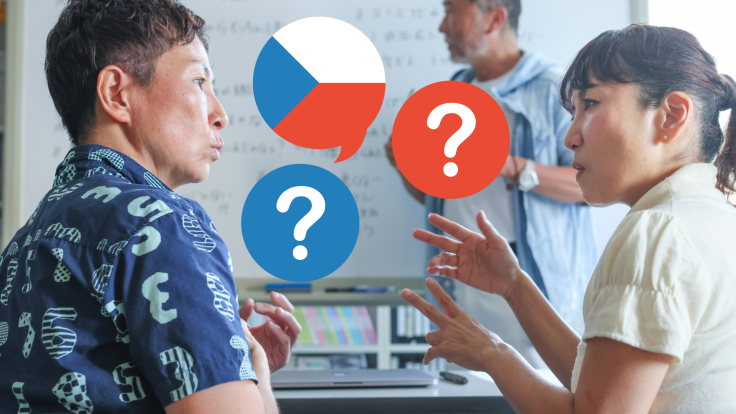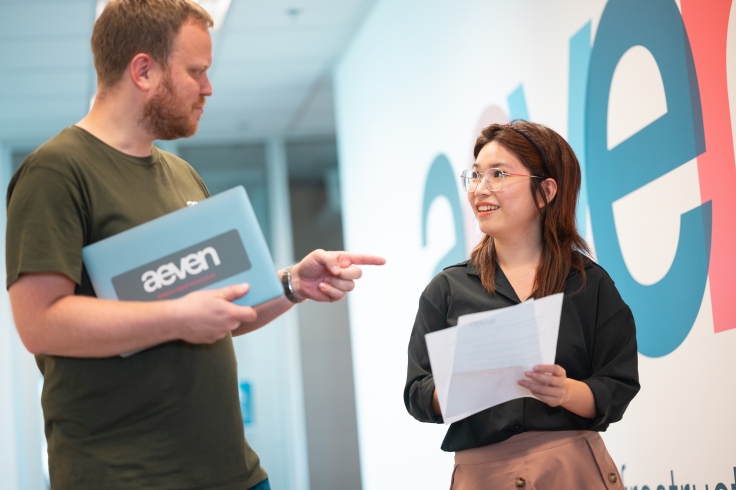This is a chapter from my bachelor’s thesis at Anglo-American University’s School of Journalism (2019). Read the full version here: Long-form article on Vietnamese Immigrants in the Czech Republic.
Multilingualism
“If the Czech idiom ‘You live a new life for every new language you speak’ (Kolik jazyků znáš, tolikrát jsi člověkem) is true then I’m five different people,” writes Ho Thu Huong in the book she co-authored with Nguyen Phan Linh and Pham Anh Duc “Green Passport Goes Around the World.”
“I have had the privilege to live in a multicultural environment since childhood, so I’m used to switching languages as well as my way of thinking and communicating when talking to somebody.”

Huong calls herself a global citizen for several reasons.
Born in Vietnam but growing up in the CR, Huong has lived in Buenos Aires (Argentina), Mexico City (Mexico), Vancouver (Canada) and now Boston (USA). She is fluent in five languages: Vietnamese, Czech, English, Spanish and French.
Spending her childhood in Havířov, a small town in the North East of the CR with a population of 80,000, Huong dreamt of traveling abroad to melting pots such as London, New York or Sydney.
Her dream pushed her to learn about other cultures and participate in various competitions that would allow her to visit other cities. Looking back, Huong realizes how her proactiveness has earned her opportunities to travel the world.
Global mentality
“Growing up in the CR, I live in two worlds simultaneously. When I’m at home, I speak Vietnamese with my family, eat traditional meals; when I’m at school, I speak Czech, eat Czech lunch, treat people more equally because in Czech, the second person pronouns do not change based on age or status as in Vietnamese. […] Thanks to my interaction with different cultures, I can compare them to each other and choose the best out of each for myself.”
Huong’s story has inspired many other Vietnamese to step out of their comfort zones, find different ways to experience new things and learn more about the world. The concept of being a global citizen also resonates with modern mothers.
“I teach my children a global mentality,” says Vuong Thuy-An, the Vietnamese mother whose son Filip Wu was introduced in chapter two. “First, I don’t want them to be influenced by [nationalist ideologies]. Second, I teach them humanism rather than following any religious beliefs.”
Unlike patriotic veteran Dai whose only wish is his children be “authentic Vietnamese,” Thuy-An does not want to preach to her children “blind patriotism,” which she experienced first-hand when marrying her Chinese husband nearly ten years ago.
“Many Vietnamese just hate Chinese people for no reasons,” says Thuy-An. “When I did a Facebook livestream discussing Chinese traditions during Lunar New Year, there were some mean comments such as, ‘do you even know how Vietnamese celebrate Lunar New Year? Why don’t you talk about it instead of Chinese New Year? So much free time, huh? You China kiss-ass!’”
Seventy-eight percent of the Vietnamese population hold unfavorable views of China, according to Global Attitudes Survey by Pew Research Center in spring 2014, due to their dreadful history of on-and-off conflicts and most recently, the South China Sea disputes.
Patriotism versus nationalism
Thuy-An also see toxic nationalism in her Chinese mother-in-law who despises the Japanese to the point she feels delighted hearing about natural disasters killing people in Japan.
“The hatred has permeated deeply into their consciousness,” she says as she curls her legs up to fit into her kitchen chair. Thuy-An does not want her children to see borders when they look at another human being. People should be treated equally regardless of their race, nationality, and gender. She teaches this to her children by talking to them for hours about her own experience.
One time, her son Filip came home crying because another student said to him, “you Chinese go back to your country!”
Seeing his tears, Thuy-An was happy.
She told him that she, too, was insulted many times for her height and skin color. She asked him how he felt when he heard the insults and explained to him that if he does not enjoy being insulted for his skin color and nationality, he should never do the same to anyone.
She thinks the experience, though painful, has taught her son a good lesson about human decency and respect.
Thuy-An’s approach to child-rearing is more open-minded because of her personality and background.
She is confident and sociable. Unlike the majority of the Vietnamese community, Thuy-An did not come to the CR to make a living, but to study at Faculty of Technology of Tomas Bata University in Zlín when she was 19. At the time, she already spoke Czech, Chinese and English besides her mother tongue. She chose to study in the CR because of she could afford it (free tuition) and she wanted to see the world.
Back when she was still in Vietnam, Thuy-An had already made friends with random foreigners on the streets of Hanoi, asked them about their cultures and brought them home to introduce them to hers. Her knowledge and experience have contributed to her worldview and set her apart from her fellow immigrants.
Life outside of stereotypes
Thuy-An’s neighbor and best friend Trang Soukupová is also raising her children to be global citizens. Trang is a divorced single mother with two daughters aged two and four, each of whom has a different father, but both fathers are Czech.
Twenty-eight-year-old Trang calls herself a “modern woman”; she single-handedly takes care of two little girls while balancing a few jobs and non-profit projects. Since their divorce three years ago, Trang and her ex-husband, who is 28 years older than her, are still on good terms. He loves the children, even though the second one is not his.
However, because of his busy work schedule, he can only drop by a few times to put the children to sleep and take them to school the next morning.

The price of being a “modern woman” is not cheap. For her lifestyle and marriage decisions, Trang has received a great deal of criticism from close family members and random Vietnamese alike. She just ignores it.
“Why do I need to react to people who don’t want to understand me and want to harm me?” she says. “Whoever understands me will sympathize with my problems. In the end, who else can live your life for you?”
As the Vice-President of Lam Cha Me CZ, Trang supports President Thuy-An in organizing extra-curricular classes, field trips and cultural events for Vietnamese families in the CR so her daughters are well exposed to both Vietnamese and Czech cultures. They both speak fluent both languages fluently, thanks to their mother speaking to them in Vietnamese while the father speaks Czech.
“My greatest success is having two nice daughters, doing what I enjoy, and surrounding myself with friends who give me energy and inspiration to live,” writes Trang on her Facebook wall. “One of the most significant impacts comes from An. Simply put, I would like to quote ‘It doesn’t matter how long we live, it’s how we live that counts.’”
Raising a global citizen: empathy, languages and experiences

Empathy
The quote “It doesn’t matter how long we live, it’s how we live that counts” is from Thuy-An’s fiction “Hanh” which touches upon many serious topics from child molestation, domestic violence, to mental illnesses and restrictive traditional gender roles.
Thuy-An even spends time discussing some of these issues with her children and encourages other parents to do the same. She does this by giving simple examples and asking for their opinions, or by explaining and encouraging them to think critically.
Languages
Empathy is key to being a global citizen, but to be a successful one, a person needs to master his or her language skill. That’s why from the day Filip was born, his mother has spoken to him in all four languages that she knows: Vietnamese, English, Czech and Chinese.
“I don’t know which language he will adapt to first,” says Thuy-An, pointing at the flower vase on the kitchen table. “For example, I will teach him this is flower, hua, hoa and květina.”

Filip started talking around two and a half, but he was confused as to which language to use, so sometimes in a sentence, he would speak all four languages.
According to Zuzana Terry in her research on bilingual families in the CR, this is called code-mixing, a common problem. Bilinguals or in Filip’s case, polyglots, become better at code-switching (changing languages) after getting enough practice.
Nine-year-old Filip now speaks Vietnamese to his mother, Chinese to his father and grandparents, Czech at school and English in daily life. Regarding Chinese, Thuy-An makes sure that her son’s linguistic level does not stop at speaking, so she makes him practice reading and writing Chinese character on the weekend. If she has time, she creates games for Filip to make learning more interesting.
Experiences
Besides learning languages, Filip also attends a number of extra-curricular activities such as football, swimming, and martial arts because his mother wants him to experience as much as he can during his childhood.
“He has to try something out to see if it fits him or not,” says An, taking an example of Filip practicing piano for three years before telling her he wanted to quit.
“I respect his decision,” she says. “I will only guide [the children] until a certain age. When they reach 18, I will kick them out of the house and go traveling. I will be their advisor, but they have to decide for themselves which major to study, who to marry, etc. because I have taught this to them since young age.”
Thuy-An wants to provide her children all the resources they need in order to “fly” and explore the world without borders. All the language lessons, extra classes, sport events and long talks about social issues are meant to help them adapt more easily into any culture.
She teaches them to keep in mind that their every move will contribute to the image of Asian people in the world; therefore, they have to live up to the expectation.
Perception of “root” (gốc)
Nguyen Phan Linh, the other co-author of the book “Green Passport Goes Around the World” born in Vietnam, has lived five years in New Zealand, three years in the CR and is now in Singapore. Linh says he carries with him Vietnamese characteristics and values wherever he goes.
“It can be said that I am a global citizen with a Vietnamese appearance,” Linh writes. “A few friends of mine joke that I am a ‘banana.’ But at the end of the day, your identity is however you perceive it. You are who you think you are.”
It is obvious that the rootlessness fear, though common, is not universal among all Vietnamese immigrants. Only people who believe in the concept of “root” fear losing it. For people who consider themselves global citizens, “root” is a social construct, not a fact because humans have migrated since ancient times and drawn borders as they went.

People’s perception of “root” also varies based on their educational, economic and professional background.
Dai, for example, served in the army when he was in Vietnam. He was trained to fight for his country. That is his “root.”
Linh, on the other hand, has traveled to different countries and made friends with people from different people since young age. His “root” is in all the places he has lived.
As the world experiences yet another resurgence of nationalism, we can all learn from Thuy-An’s lesson to her son when he was bullied in school “do unto others as you would have done to you.” If a person wants acceptance and respect from others, he/she has to show the same first.
There might be less violence and hatred if people open their minds and forget the borders.
Czechs, Slovaks, Vietnamese, or Chinese are not people from different nations. They are one people of the world.




Love watching sunset !
LikeLike